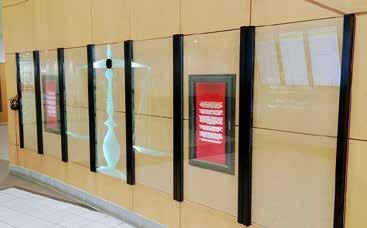
3 minute read
Argo Corner
Balancing a Speedy trial with a Slow Virus
by Ben Lindquist, UWF Legal Studies student
The COVID-19 pandemic has
forced modifications from everyone involved in the Florida Judiciary. In response, Chief Justice Charles T. Canady released Administrative Order No. AOSC20-23 that outlined temporary changes to many procedures, including the speedy trial process for those charged with a crime. The Florida Supreme Court has delicately balanced defendants’ Sixth Amendment right to a speedy trial with the need to keep the general populace healthy.
The administrative order is currently on its seventh iteration after being amended most recently on October 2, 2020. The administrative order states that:
All time periods involving the speedy trial procedure in criminal and juvenile court proceedings shall remain suspended until 90 days after the Chief Justice has approved the certification of a chief judge of a judicial circuit that the circuit or a county within the circuit has transitioned to Phase 3…
Currently no counties have yet transitioned to Phase 3.
This order has the potential to conflict with the provisions of Fla. R. Crim. P. 3.191 as well as the Speedy Trial Clause of the Sixth Amendment of the United States Constitution. According to Rule 3.191(a), anyone who is charged with a misdemeanor must be brought to trial within 90 days of arrest, or within 175 days of arrest if charged with a felony. This is how Florida guarantees the right to a speedy trial. The administrative order seemingly does not violate this rule due to its section (l), which mentions exceptional circumstances. The COVID-19 pandemic might constitute an exceptional, unavoidable, and unforeseeable occurrence.
COVID-19 related tolling or suspension of the speedy trial period has not yet come up in the United States Supreme Court, so there cannot be a definite answer on how a Sixth Amendment challenge would be decided. The best that can be done is to look at precedent, such as Barker v. Wingo, where Justice Powell delivered the opinion for a unanimous court. He stated that each speedy trial case needs to be approached on an ad hoc basis, with the consideration of four factors: length of delay, the reason for the delay, the defendant’s assertion of his right, and prejudice to the defendant.
Though the constitutionality of this order may come before the court in the future, we can look to preceding orders for guidance on possible limitations. Administrative Order No. AOSC20-13, which preceded Administrative Order No. AOSC20-23, states the following:
Photo by Bill Oxford on Unsplash
[I]t is the intent of this order temporarily to suspend grand jury proceedings, jury selection proceedings, and criminal and civil jury trials, and to temporarily suspend procedural requirements and limitations that could hinder efforts to mitigate the effects of COVID-19[.]
This is a significant limitation which constrains the administrative order to the above mentioned court activities, and does not seem to allow such action as the suspension of the speedy trial time limit for arraignment.
Florida is certainly not in isolation considering that the federal government and all other states are facing similar balancing issues. Florida courts, on one end, face the potential violation of thousands of defendants’ constitutional rights to a speedy trial, and on the other end face potentially contributing to a deadly COVID-19 swell in our state. It is a delicate situation that is unprecedented in our modern, relatively fast-moving judiciary.
Need a Lawyer?
it is always a good idea to check with a lawyer before you make an important decision—whether you are buying a house, making a business deal, or settling a dispute. A short talk with a lawyer often tells you all you need to know—how serious a problem is, how to handle it swiftly and how to make sure it is settled for good.
Get Answers to Legal Questions Such As...
Marriage, Divorce & Family Matters Business Problems Criminal Charges of Juvenile Hearings Wills, Trusts & Property of Decreased Relatives Tax Problems & Planning Corporation & Partnership Matters Credit or Collection Problems Real Estate Purchases, Sales or Disputes Consumer Problems Landlord/Tenant Relations Injuries to Yourself or Family Members Property Damage Job Discrimination or Employer/Employee Disputes Workers’ Compensation Patents, Trademarks or Copyrights Wages & Benefits Social Security Disability Labor Law
With over 50 participating local attorneys experienced in many different areas of law, we can help you find an attorney to handle your case.
Your call is free. When you meet with your lawyer, there will be a small fee of $40.00 for the first half-hour consultation. Fees for additional services after the first half-hour are arranged between you and your lawyer.
We do not have attorneys who accept pro bono or contingency cases.






